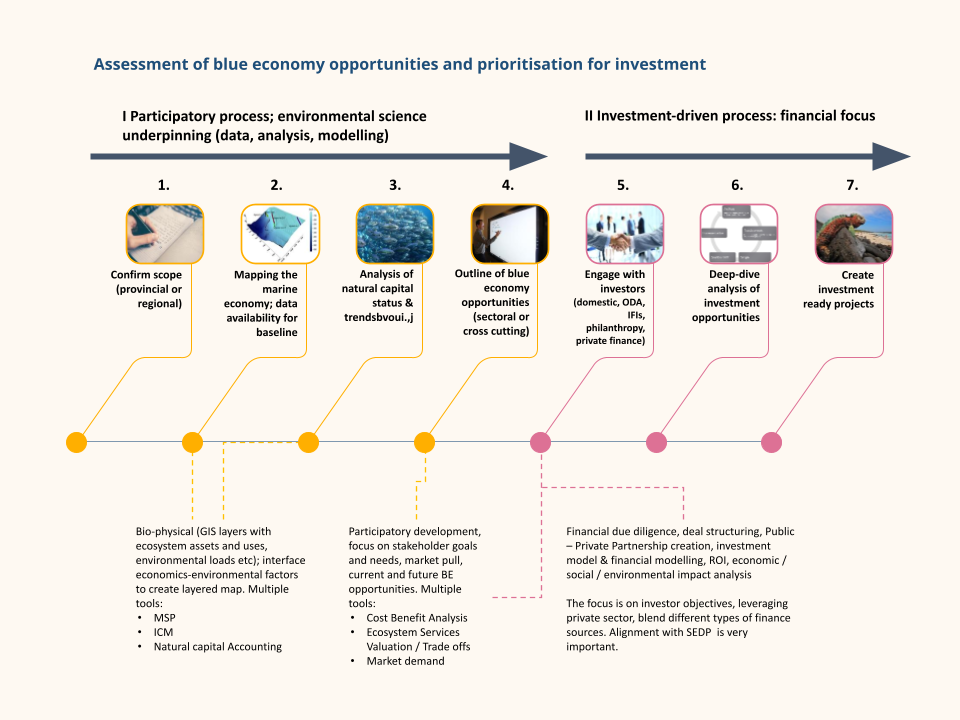About the client
With 189 member countries, the World Bank Group is a unique global partnership that is one of the world’s largest sources of funding and knowledge for developing countries. Its five institutions are working for sustainable solutions that reduce poverty, build shared prosperity in developing countries and promote sustainable development.
Executive Summary
The World Bank and Government of India had been collaborating to develop a long-term programme to direct funding and resources to coastal and marine management. The Enhancing Coastal and Ocean Resource Efficiency (ENCORE) programme will help India enhance its coastal resources, protect coastal populations from pollution, provide new marine protected areas, mitigate erosion and sea level rise exacerbated by climate change, and improve livelihood opportunities for coastal communities.
EnviroStrat was asked to provide a practical step-by-step approach on how to undertake an assessment of blue economy opportunities in a state or island group with a view to future investment, ensuring a strong focus on identifying future sustainable, blue economy opportunities. We also updated the Indian guidelines on Integrated Coastal Zone Management Planning to ensure both marine spatial planning and blue economy development are recognised as key components of future coastal and marine development in India.
While the guidelines are specific to the Indian context, the approach can be applied and is replicable for different scales across other countries.
Introduction to the project
Several years of planning, scoping, and piloting integrated coastal zone management planning culminated in April 2020 when the World Bank approved a $400 million multi-year financing envelope to help India enhance its coastal resources, protect coastal populations from pollution, erosion and sea level rise, and improve livelihood opportunities for coastal communities.
EnviroStrat played a leading role through 2018 and 2019 in working closely with the World Bank, federal and state governments in India, and the lead technical provider, the National Centre for Sustainable Coastal Management (https://www.ncscm.res.in/) to help develop a strategic and systematic approach to identifying, qualifying, and creating investable projects for ENCORE.
The multi-phase approach for the Enhancing Coastal and Ocean Resource Efficiency (ENCORE) programme was in response to the growing need to safeguard India’s coastal and marine assets over the next decade. ENCORE covers eight coastal states (Andhra Pradesh, Gujarat, Goa, Karnataka, Kerala, Odisha, Tamil Nadu and West Bengal) and three coastal Union Territories (Daman and Diu, Lakshadweep, and Puducherry) where coastal resources are under significant pressure.
With an extensive list of potential projects and initiatives provided by the Indian government, states and territories, EnviroStrat was commissioned to develop a strategic framework for blue economy development, providing transparency and confidence to the World Bank on how to allocate and prioritise funding.
Our approach
Under the ENCORE programme each state and territory needed to develop and implement an Integrated Coastal Zone Management Plan and Marine Spatial Plan that would enable future blue economy development to be undertaken within a broader planning and policy context.
Our role was threefold:
- Help states and territories adopt a strategic and systematic blue economy development approach.
- Test this approach with three states to ensure it is fit-for-purpose.
- Provide long-term support to the Government of India in developing blue economy and marine spatial planning needs
The first step was to seek to ensure each participating state and territory had proper strategic, planning and policy context, rather than simply a list of projects to implement without context. The dynamic between the World Bank as a lender, and the Indian federal and state governments added another layer of complexity, especially where there were misaligned priorities or expectations.
We developed guidelines that provided a practical step-by-step approach on how to undertake an assessment of blue economy opportunities with a view to informing future investment from the World Bank, government of India, as well as private investors.

The intended approach was that the guidelines would be applied with each participating state and territory to ensure they were doing the right things, in the right place, for the right reasons, with outcomes that would be economically viable, environmentally and socially sustainable. The process recognises what opportunities exist based on natural capital, workforce and infrastructure characteristics and constraints, and current economic activity. For example, a state that is economically reliant on industrial, ports, or ship building is probably not where you’re doing to develop eco-tourism.
EnviroStrat CEO Dr Nigel Bradly was invited to speak at an international conference on integrated coastal zone management in Chennai, India in 2019 about the role of marine spatial planning in enabling blue economy investment.
The result
We developed a methodology for blue economy development under the ENCORE programme. The next stage was to pilot it in three states alongside the technical leads at NCSCM before being rolled out to all participating states and territories. However, before the pilot could start the global COVID-19 pandemic hit and ENCORE has been on pause since then.
We have subsequently taken the approach we developed, refined and applied it to Vietnam
Key Metrics
- $400 million multi-year financing envelope from the World Bank
- 13 participating states and union territories
- Federal leadership through Society for Integrated Coastal Management within Ministry of Environment, Forests and Climate Change
- Research and technical leadership through National Centre for Sustainable Coastal Management at Anna University, Chennai


